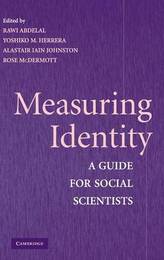
|
Measuring Identity: A Guide for Social Scientists
Hardback
Main Details
| Title |
Measuring Identity: A Guide for Social Scientists
|
| Authors and Contributors |
Edited by Rawi Abdelal
|
|
Edited by Yoshiko M. Herrera
|
|
Edited by Alastair Iain Johnston
|
|
Edited by Rose McDermott
|
| Physical Properties |
| Format:Hardback | | Pages:438 | | Dimensions(mm): Height 234,Width 156 |
|
| ISBN/Barcode |
9780521518185
|
| Classifications | Dewey:305.0723 |
|---|
| Audience | | Professional & Vocational | |
|---|
| Illustrations |
28 Tables, unspecified; 20 Line drawings, unspecified
|
|
Publishing Details |
| Publisher |
Cambridge University Press
|
| Imprint |
Cambridge University Press
|
| Publication Date |
6 April 2009 |
| Publication Country |
United Kingdom
|
Description
The concept of identity has become increasingly prominent in the social sciences and humanities. Analysis of the development of social identities is an important focus of scholarly research, and scholars using social identities as the building blocks of social, political, and economic life have attempted to account for a number of discrete outcomes by treating identities as causal factors. The dominant implication of the vast literature on identity is that social identities are among the most important social facts of the world in which we live. Abdelal, Herrera, Johnston, and McDermott have brought together leading scholars from a variety of disciplines to consider the conceptual and methodological challenges associated with treating identity as a variable, offer a synthetic theoretical framework, and demonstrate the possibilities offered by various methods of measurement. The book represents a collection of empirically-grounded theoretical discussions of a range of methodological techniques for the study of identities.
Author Biography
Rawi Abdelal is Professor at Harvard Business School. He is the author of National Purpose in the World Economy: Post-Soviet States in Comparative Perspective (2001) and Capital Rules: The Construction of Global Finance (2007). Yoshiko M. Herrera is Associate Professor in the Department of Political Science at the University of Wisconsin, Madison, and author of Imagined Economies: The Sources of Russian Regionalism (2005) and Transforming Bureaucracy: Conditional Norms and the International Standardization of Statistics in Russia (2009). Alastair Iain Johnston is the Laine Professor of China in World Affairs in the Government Department at Harvard University. He is the author of Cultural Realism: Strategic Culture and Grand Strategy in Chinese History (1995) and Social States: China in International Institutions, 1980-2000 (2008), and co-editor of Engaging China: The Management of an Emerging Power (1999), New Directions in the Study of China's Foreign Policy (2006), and Crafting Cooperation: Regional Institutions in Comparative Perspective (2007). Rose McDermott is Associate Professor of Political Science at the University of California, Santa Barbara. She is the author of Risk Taking in International Relations (1998), Political Psychology in International Relations (2004), and Presidential Leadership, Illness, and Decision Making (2008).
Reviews'With its momentous theoretical, methodological, and empirical sweep, this tour de force in constructivist political science shows how to do studies that are both context-sensitive and generalizable across contexts. Here one learns about measures of social separation and graded ethnicity; incongruence analysis of identity structures in leader statements; constructivist datasets on ethnicity and institutions, textual analysis for identifying dominant identity discourses within a country - and much more. A must read for students of identity in politics and society as well as for policy analysts who seek rigorous methods to make sense of political and social discourses decisively affecting key domestic and international issues.' Mikhail A. Alexseev, San Diego State University 'Legions of social scientists working in many fields of the social sciences are grappling with the intricate problems of translating the theoretical insights of identity theories into empirically rigorous research programs. Measuring Identity provides an indispensable service to all scholars. It introduces the reader to state-of-the art overviews and assessments of the most relevant methods. Leading scholars in identity research offer expert treatments of survey methods, content analysis, cognitive mapping, discourse analysis, ethnography and experimental methods. As a research guide and teaching tool, social scientists will want to have this book close at hand.' Peter J. Katzenstein, Cornell University
|